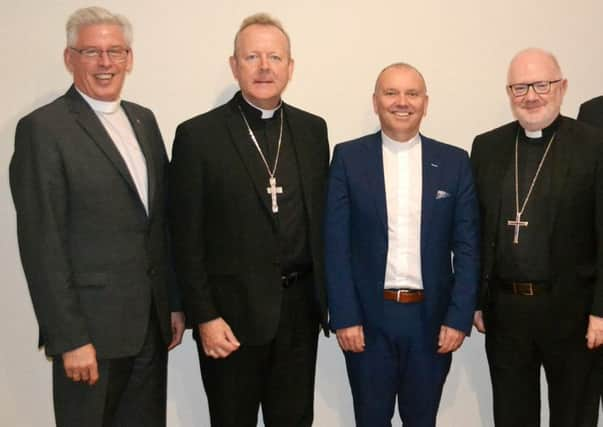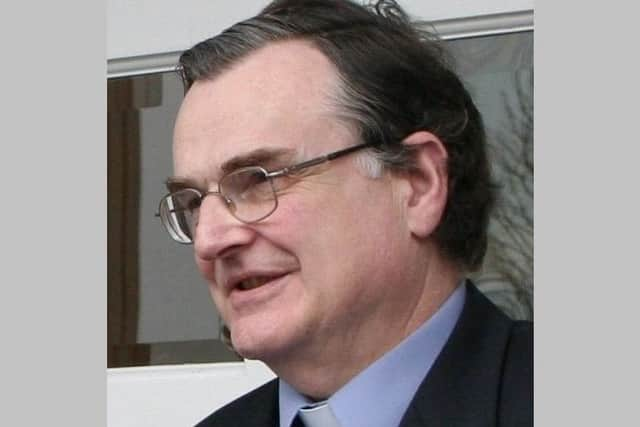Ian Ellis: Ending welfare mitigation payments could mean 35,000 households in Northern Ireland will see their incomes fall suddenly


This is known as the ‘mitigation package’, justified on the grounds that Northern Ireland faces special circumstances that do not apply in the rest of the UK.
In the first joint report of the Work and Pensions and the Northern Ireland Affairs Committees, published on September 9, it is indicated that the clearest example of these special circumstances is the nature of Northern Ireland’s social housing stock, which means that “the Social Sector Size Criteria (‘bedroom tax’) would have a disproportionate impact on people in Northern Ireland if mitigations were not in place”.
Advertisement
Hide AdAdvertisement
Hide AdThe report indicates that, overall, the mitigation package has been “a success” but points out that not all the funding allocated for the mitigation package has been spent, mainly due to the fact that there has been no executive and assembly.


According to the legislation providing the legal basis for welfare supplementary payments, those payments can only be made until the end of March next year.
This legislation cannot be changed as Stormont approval would be required and the assembly, of course, is not sitting.
The joint report indicates that the ending of the mitigation payments in March 2020 “would mean that over 35,000 households in Northern Ireland would see their incomes fall suddenly, some by hundreds of pounds per month”.
Advertisement
Hide AdAdvertisement
Hide AdThe joint committee has said that, in these circumstances, Westminster “must act quickly to end the uncertainty around the mitigation package” as the Department for Communities has indicated that it would need to start contacting claimants if it were not to continue.
However, Northern Ireland Minister Nick Hurd has insisted that this is a matter for the devolved administration, urging its swift restoration.
The joint report points out that in the absence of such legislation, the Department for Communities has said that it could pay ‘bedroom tax’ and benefit cap mitigations through Discretionary Housing Payments, but that this would be “operationally extremely challenging”.
The serious administrative problems with this include the fact that making discretionary payments on such a large scale is very difficult to say the least.
Advertisement
Hide AdAdvertisement
Hide AdThe Irish Church Leaders Group had outlined their views in a written submission to the Joint Inquiry into welfare policy in Northern Ireland.
Representing the Church of Ireland, the Methodist and Presbyterian Churches, the Roman Catholic Church and the Irish Council of Churches, the church leaders referred to “the potentially devastating impact of the loss of social security mitigation measures in March 2020”.
They indicated that they were making their submission out of pastoral concern and pointed out that churches are responding to social and economic need “on a daily basis” through ongoing pastoral work, food banks and lunch clubs and the provision of residential facilities for ex-offenders or those struggling with addiction.
They said their concerns were exacerbated by the two and a half year absence of a functioning Executive and Assembly at Stormont.
Advertisement
Hide AdAdvertisement
Hide AdWhat is striking about the church leaders’ submission is its scope and depth, highlighting many issues, including:
• Inadequate support for vulnerable service users — The submission said that representatives of Belfast City Centre Chaplaincy, a pioneer Methodist mission project established last year as an interdenominational pastoral outreach, told the church leaders: “The requirement for claimants to complete [Universal Credit] applications online, unaided, is unrealistic and an insurmountable barrier in some cases.” The representatives stated: “We find that chaplains are also having to provide pastoral care to the staff in the JBOs [Jobs and Benefits Offices] who want to help vulnerable people access support and are frustrated and distressed by the barriers that prevent them from doing so.”
• Impact of benefit delays — Among the issues raised by the Society of St Vincent de Paul in relation to Universal Credit was the fact that claimants are facing delays of six weeks and, in some cases, even longer, resulting in rent arrears. SVDP stated: “Where advance payments are offered to people facing long delays, these are often inadequate (typically £200).”
• Sanctions — The church leaders expressed concern in particular that “there are insufficient protections to protect people who have been subject to sanctions without due process”.
Advertisement
Hide AdAdvertisement
Hide Ad• Food banks — The church leaders referred to figures released by the Trussell Trust indicating that from April 2018 until March this year “36,783 adults and children in Northern Ireland were beneficiaries of their 3-day emergency food parcels”. This represented a fifty percent increase on the 2015-2016 figures. It was also pointed out that other food banks had to be added to these statistics.
• Two-child limit — This policy limits household benefits to two children unless certain exceptions apply, but the church leaders pointed out that it has the potential to have a more significant impact in Northern Ireland “given that compared to the rest of the UK Northern Ireland has the highest percentage of households with children”. They added that “it is not morally or ethically justifiable to deprive a child of support in this way”, and stated that the policy “undermines the fundamental human rights of any child, including under Articles 2, 3, 26 and 27 of the UN Convention on the Rights of the Child, and discriminates against him or her on the basis of the number of siblings that he or she may have”.
• Sectoral size criteria (‘bedroom tax’) — The church leaders stated that less than 20% of social housing stock in Northern Ireland comprises only one bedroom, while single working age applicants account for almost half of the waiting list, resulting in there not being enough dwellings to meet the demand that the introduction of social sector size criteria will create. They pointed out that the NI Housing Executive’s own Welfare Reform Project Team has calculated that around 33,000 existing social sector housing claimants in Northern Ireland would face “a significant reduction in housing benefit due to the application of the social sector size criteria”.
• Personal independence payments (PIP) — Referring to problems experienced by people migrating from Disability Living Allowance to the PIP, which they say have been extensively documented, notably the high level of initial assessment decisions being overturned on appeal, the church leaders said they welcomed the announcement that the Northern Ireland Public Services Ombudsman is to carry out an investigation into the administration of this system. They also stated their concern, given that the welfare reforms were intended to incentivise employment, at the high level of claimants losing their mobility vehicle following PIP assessments, adding: “In many cases people depend on this transport to access employment, in addition to other needs, and the removal of this support therefore increases welfare dependence.”
Advertisement
Hide AdAdvertisement
Hide Ad• Education and awareness — The church leaders stressed the need for additional support around education and awareness in light of the welfare system changes currently being embarked on and those changes scheduled to be implemented in 2020.
The church leaders have presented a very challenging case in circumstances that are fraught in the extreme.
• Canon Ian Ellis is a former editor of The Church of Ireland Gazette.